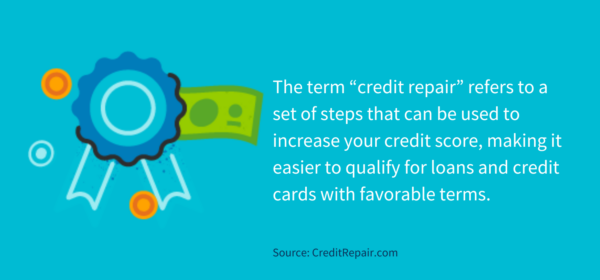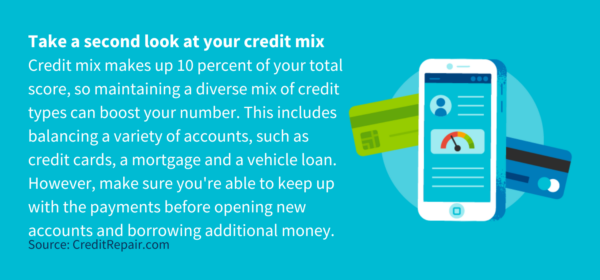
Disclosure regarding our editorial content standards.
If you’re struggling with overdue loan payments, high credit card balances or collections notices, you may be feeling the burden of bad credit. This can prevent you from accomplishing financial milestones such as purchasing a new car or your dream home. Bad credit also can mean racking up interest, leaving you with a mountain of debt that may seem impossible to pay off.
The average credit score in the U.S. is currently 714, which is considered good. However, these scores fluctuate significantly depending on state and age. Even though Americans have the highest recorded consumer debt in history at $14.3 trillion, credit scores are on the rise. Fortunately, with the right financial practices, you can fix your credit.
What does it mean to repair your credit?

A low credit score makes it difficult to qualify for mortgages, auto loans, personal loans and credit cards. Even if you qualify, you may have to pay a higher interest rate than someone with a better score. The term “credit repair” refers to a set of steps that can be used to increase your credit score, making it easier to qualify for loans and credit cards with favorable terms.
The Credit Repair Organizations Act, part of the Consumer Credit Protection Act, gives you the right to work directly with credit bureaus to challenge inaccurate items on your report. If your score needs a boost, you can try to repair your credit yourself, or you can have a reputable credit repair company manage disputes on your behalf.
Why your credit might need repair
When applying for financial products, good credit may save you hundreds or thousands of dollars in interest charges. The worse your credit is, the more you’ll pay in interest. This means the new house or car you want might have a higher monthly payment than you can afford, or you might not qualify for a loan at all.
Repairing your credit involves following simple steps that anyone could follow. They may enhance your eligibility for credit cards and loans with more favorable terms.
What is a good credit score and why does it matter?
Lenders typically use the FICO® score model when deciding whether to approve someone for a line of credit. These scores range from 300 to 850 and are separated into five categories ranging from poor to excellent. A FICO score of 670 to 739 is considered a good credit score.
Lenders use your credit score to gauge how responsible and trustworthy you are as a borrower. They’re less willing to approve borrowers they view as high-risk. Therefore, if your credit report shows a history of positive items, such as on-time payments and a low credit utilization ratio, you’ll be one step closer to qualifying for a new line of credit.
Is it legal to repair your own credit?
If your credit needs a boost, it’s perfectly legal to repair your credit on your own. The Credit Repair Organizations Act went into effect in 1997. As part of the Consumer Credit Protection Act, this law gives consumers the right to collaborate with credit bureaus to dispute inaccurate items found on their credit reports. This law also makes consumers less likely to be taken advantage of by credit scams.
How long does it take to repair your credit?
Repairing your credit can take anywhere from 30 days to several years. It depends on your credit and the negative items affecting it. For instance, if you have a serious negative item on your credit report, such as a bankruptcy, the item can remain on your report for up to 10 years. Although credit repair doesn’t happen overnight, there are steps you can take to gradually fix your credit.
13 steps you can take to start repairing your credit
If you want to work on improving your credit, start by taking these 13 steps.
1. Review your credit reports thoroughly
The first step in repairing your credit is to order copies of your credit reports from the big three bureaus: Equifax, Experian and TransUnion. By law, you’re entitled to receive a free copy of each report every 12 months. To request a free report, visit AnnualCreditReport.com or call (877) 322-8228. Equifax, Experian and TransUnion offer free reports only through this website. If you request a report directly from one of the bureaus, you’ll have to pay a fee.
Once you receive your reports, check to see if they contain any errors. Look for incorrect Social Security numbers, names, account numbers, payment dates, addresses and payment amounts. It’s also important to check for incorrect employer names and birth dates.
2. Identify inaccurate items and dispute them
If you notice inaccurate information on one of your credit reports, you have the right to dispute it with the credit bureaus. Although some agencies give you the option of submitting an online dispute, it’s better to mail a hard copy. Online forms generally don’t provide enough room for you to add plenty of supporting details, and you may not be able to attach supporting documentation to an online dispute form.
The Federal Trade Commission offers a template that you can follow when drafting these letters. Send each one via certified mail to create a record of when it was mailed and when it was received by the credit bureau.
3. Keep detailed records and follow up
Before mailing your dispute letters, make copies for your records. Because credit bureaus have a limited amount of time to respond to your inquiries, it’s important to keep track of mailing dates and addresses. If you don’t receive a response from one of the agencies, write a second letter to follow up on your request.
4. Pay all of your bills on time
Your FICO credit score is based on five factors: payment history, the amount of debt you have, the length of your credit history, your credit mix and the number of new accounts you’ve opened recently. Payment history accounts for 35% of your score, making it extremely important to pay your bills on time.
The effect of a late payment on your score depends on several factors, including how late the payment is and whether you manage to catch up on your payments before the account is charged off. For example, a 120-days-late payment has more of an effect on your score than a 30-days-late payment. As you repair your credit, the effect of a late payment starts to subside. Eventually, it stops affecting your score—as long as you don’t have any additional late payments.
5. Work to reduce your debts
The amount of debt you have accounts for 30% of your FICO credit score. If your credit cards are maxed out or you have high loan balances, your score will be lower than the score of someone who has small loan balances or paid-off credit cards. To repair your credit, work on reducing your balances as fast as possible.
If you have any money left over after paying your bills, use it to make extra payments on your credit accounts. Not only will this bring down your balances, but you’ll also reduce the amount of interest you pay by paying off more of the principal balance each month.
If necessary, consider enrolling in a debt-management program to make it easier to repay your debts. This type of program helps increase your score because creditors agree to report each account “paid as agreed” as long as you make your scheduled payments to the debt-management plan each month. If you’re interested in debt management, look for a nonprofit service provider registered with the National Foundation for Credit Counseling.
6. Use credit responsibly
Several habits can affect your FICO score, including running up the balances on your credit cards, taking out large loans, doing frequent balance transfers or opening many new accounts in a short period of time. These activities hurt your score because they make it riskier for financial institutions to extend you credit.
If you have a credit card, use it to make one or two small purchases each month, and then pay them off before interest starts to accrue. Avoid opening multiple credit cards in rapid succession, as doing so can make creditors worry that you’ll max them out without paying off the balances.
7. Watch your credit utilization ratio
Credit utilization accounts for 30 percent of your credit score. This makes credit utilization the second most influential factor after payment history. Your credit utilization ratio is the amount of credit you’re using compared to the amount of credit available. For example, if you have a credit card with a $10,000 limit and your balance is at $3,000, your credit utilization is 30 percent.
Ideally, you should try to keep your ratio at 30 percent or less. If a lender sees a high credit utilization ratio, such as 90 percent, they may view this as a red flag and think you’re experiencing financial issues. As a result, the lender will be less likely to approve you for a new line of credit. Therefore, try paying down higher balances to decrease your card usage.
8. Take a second look at your credit mix

Credit mix makes up 10 percent of your total score, so maintaining a diverse mix of credit types can boost your number. This includes balancing a variety of accounts, such as credit cards, a mortgage and a vehicle loan. However, make sure you’re able to keep up with the payments before opening new accounts and borrowing additional money.
9. Don’t close old credit card accounts
Once you pay off a credit card, you may be tempted to close the account. However, this may not be in your best interest. Length of credit history makes up 15 percent of your credit score. By closing the account, you risk losing years of credit history that establish you as a responsible borrower. Although card issuers eventually may close the account after a certain period of inactivity, it could be several years until that happens.
10. Look for ways to report more payments to the credit bureaus
There are many types of payments besides loans and credit cards that show you’re capable of paying bills on time. For instance, you can contact a credit bureau and request to have other payments added to your credit history, such as rent, utilities, cell phone or streaming services. Including additional positive payment history on your report can better your credit.
11. Exercise patience
Being patient may be hard, especially if you’re looking to open a new line of credit soon. However, certain negative items, such as hard inquiries, bankruptcy, late payments or debt collections, take years to fall off your credit report. Chapter 7 bankruptcy can take a full decade. While you’re waiting for a negative item to fade, being patient and practicing good credit habits can improve your credit.
12. Apply for new credit sparingly
Opening the occasional new line of credit can help your credit. However, applying for too much credit in a short period of time may cause lenders to view you as risky. These rapid applications can generate hard inquiries, reduce the average age of your accounts and make you seem desperate for credit. Therefore, be mindful when applying for credit and open only the accounts you need.
13. Follow a budget
Take a look at your finances. If you’re spending more than you’re earning, chances are you need to set a budget. You can begin by examining how much money you take home each month. Then, subtract monthly expenses such as car payments, rent and insurance from your income. With whatever money’s left over, assign how much can be spent on other financial categories, such as groceries or leisure activities.
FAQs about credit
How can you increase your credit quickly?
Reducing your credit utilization ratio is one of the fastest ways to increase your credit score. If any of your credit cards is close to being maxed out, try paying it off first. Once your lower balance is reported to the bureaus, you may see your credit score increase in a few months.
Does carrying a balance on a credit card help build credit?
Carrying a credit card balance doesn’t improve your credit. In fact, it can cause you to spend more money in the long run. Each time you don’t pay your statement balance in full, you run the risk of accruing more interest. This is especially true if you’re only making the minimum payment. Therefore, paying off the balance is the best way to build credit.
What other things can help build credit?
If you’re juggling high-interest credit card balances, consolidating your debt can reduce your monthly payments. This may make your debt easier to pay off. A debt management plan, which is a structured repayment plan that doesn’t require a loan, is another option. Usually issued by credit counseling agencies, this plan is meant to reduce your interest rate and provide a monthly payment plan that aligns with your budget.
Should you pay off the accounts sent to collections?
Collection accounts can be highly influential on your credit. These accounts fall under your payment history, which accounts for 35 percent of your score. Once you pay off your collection debts and the collectors update your owed balance to zero, your credit score can increase. Paying these debts may prevent lenders from potentially suing you as well.
Professional credit repair: a good alternative to DIY
Professional credit repair is a good alternative to the DIY version, especially if you’re busy and don’t have time to examine your credit reports, write dispute letters and follow up with the credit bureaus. If you go this route, it’s important to understand that there are legitimate and illegitimate credit repair companies out there. Research your options carefully to make sure you choose a reputable service provider. Never work with a company that promises 100 percent positive results.
The pros know the ins and outs of the industry
It can be tricky to repair your credit yourself if you don’t know your rights under the various consumer protection laws. Credit repair professionals understand the ins and outs of the Fair Debt Collection Practices Act, Fair Credit Reporting Act and Fair Credit Billing Act, giving them insight into the best way to improve your score within the shortest possible time frame. Their knowledge of these laws also helps them avoid some of the mistakes made by amateurs, improving your chances of having negative items removed from your credit reports.
Investing in better credit can have long-term benefits
Professional credit repair is an investment in your future, as spending a little money now can help you save thousands of dollars in interest over your lifetime. Lenders use your credit score to determine how much of a risk you represent. Borrowers with the highest scores, usually above 700, qualify for the lowest interest rates. According to financial experts from the Consumer Financial Protection Bureau, consumers with low scores—in the low to mid-600s—“generally pay the highest rates and have the fewest choices.”
Investing in credit repair now can help you qualify for lower rates in the future, helping you save thousands of dollars. If you repair your credit, you may also qualify for a broader range of financial products, making it possible to purchase a home or an automobile at just the right time. You can always cancel the service once your score has improved enough to meet your needs.
It can take a while to repair your credit, and it may be a little stressful, but it’s usually worth it when your score increases and you have the peace of mind of knowing you can access credit when you need it. You have the option of trying to repair your credit yourself, but if that isn’t a great fit for you, working with a professional credit repair agency like CreditRepair.com is also an option and can make the process less stressful.
Note: The information provided on CreditRepair.com does not, and is not intended to, act as legal, financial or credit advice; instead, it is for general informational purposes only.
Questions about credit repair?
Chat with an expert: 1-800-255-0263






